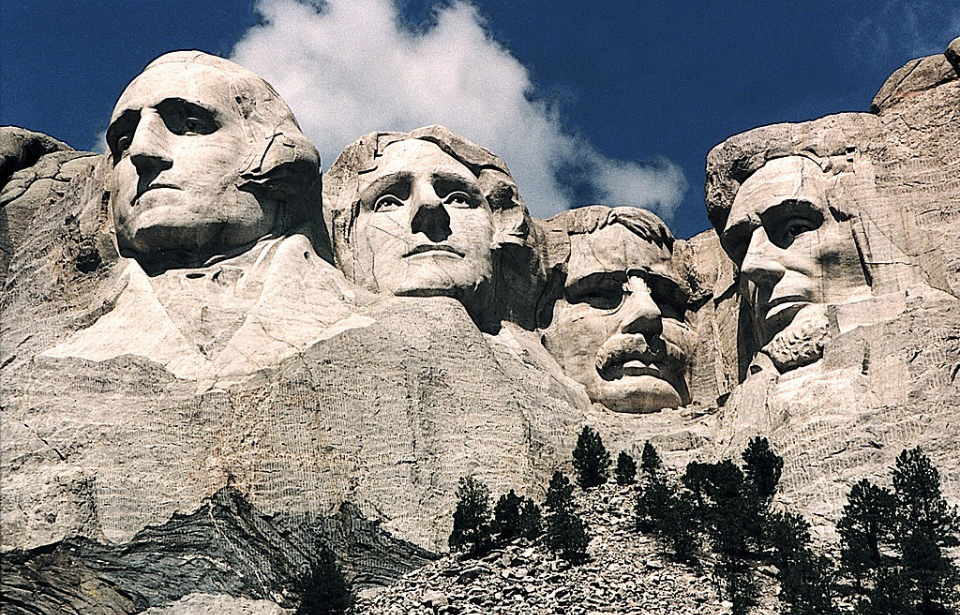Mount Rushmore is one of the most recognizable and patriotic monuments in the United States. Located near Keystone, South Dakota, it plays host to more than two million visitors annually, all of whom are drawn to the almost unfathomable 60-foot-tall heads carved into the mountainside.
What many of these tourists might not know is that the four presidents – Thomas Jefferson, Theodore “Teddy” Roosevelt, George Washington and Abraham Lincoln – weren’t initially intended to be just their heads. Plans had been in place to carve them down to their waists, but unexpected hiccups prevented this.
Approving the carving of Mount Rushmore
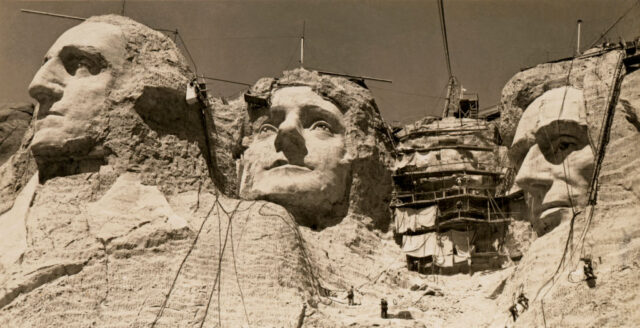
At first, Mount Rushmore was an undertaking geared toward increasing tourism in South Dakota, as the state’s economy was in less than stellar condition. Doane Robinson of the South Dakota Historical Society was the one to think up the idea, saying that the monument would be carved into the Black Hills mountain range.
After some negotiation, the project was approved, with federal funding allocated to aid in the sculpture’s production. As it was considered the most stable area of the Black Hills, the decision was made to have Mount Rushmore become the location for the stone presidents.
Deciding which presidents would be featured
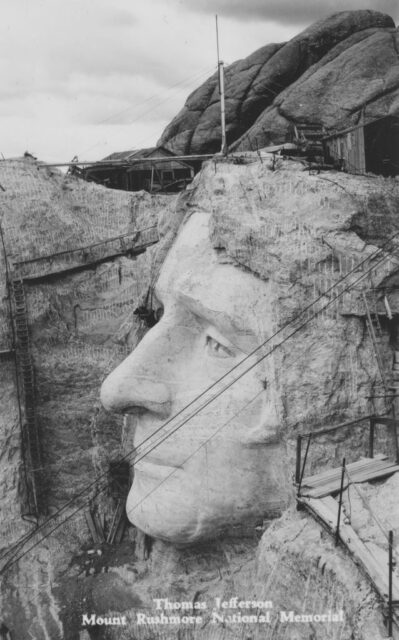
With the project approved, it was time to decide which presidents would be immortalized in the granite of Mount Rushmore. Designer Gutzon Borglum chose George Washington and Abraham Lincoln for their popularity, while Thomas Jefferson was picked for how much he expanded the United States following the Louisiana Purchase.
Then-President Calvin Coolidge also had a say on who’d be featured. He opted for Theodore Roosevelt for his establishment of the National Park Service (NPS). His inclusion also ensured there was an equal number of Democrats and Republicans represented.
Work on Mount Rushmore begins
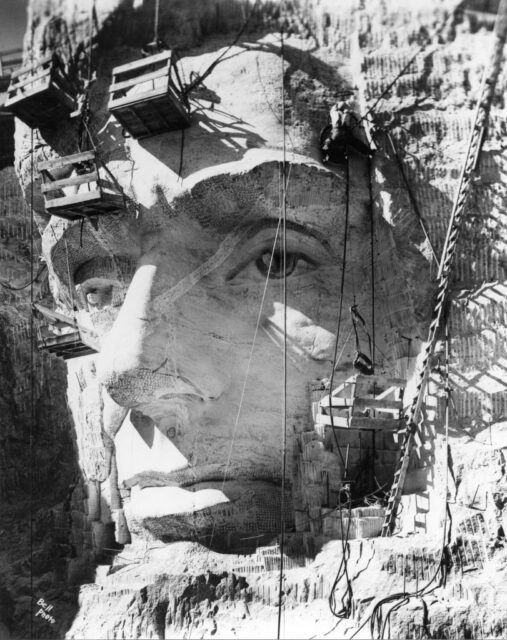
Work on Mount Rushmore began in October 1927, with the intention being to produce four head-to-waist sculptors of the men chosen. Italian sculptor Luigi Del Bianco was called in to serve as the chief carver, and 400 men worked tirelessly to turn what was once an idea on paper into a real-life monument.
Given they were working on the side of a granite mountain, the team had to make extensive use of dynamite, with it being used to carve out 90 percent of Mount Rushmore. This was followed by a process known as “honeycombing,” in which workers drill holes close together, allowing small pieces to be removed by hand.
Over the 14 years work took place, over 450,000 tons of rock were removed from Mount Rushmore. The effort cost $989,992.32, with workers earning $8.00 a day.
Plagued by unforeseen issues
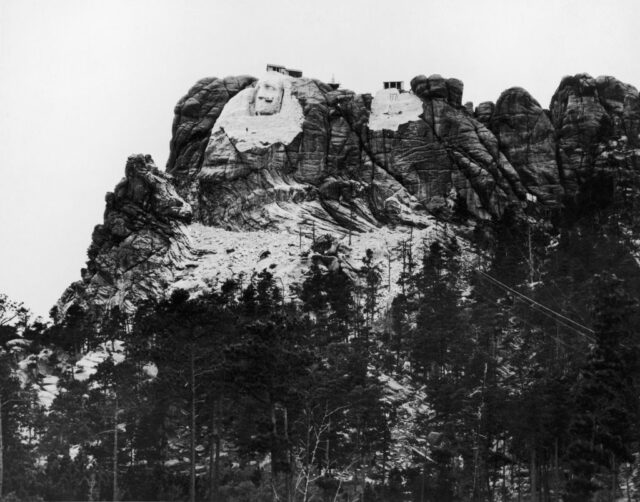
Unfortunately, a number of issues arose during the process of sculpting Mount Rushmore. For starters, the location of Thomas Jefferson’s head was changed from the right of George Washington to the left, after Gutzon Borglum found the rock was of poor quality. Thankfully, the head hadn’t been fully completed when this decision was made.
While Abraham Lincoln’s head was difficult to carve, due to his beard, the workers were able to complete it by 1937. It wasn’t until they got to Theodore Roosevelt’s that they really ran into issues.
By the time work had begun on the president’s sculpture, tourist amenities were beginning to be built, putting pressure on Mount Rushmore to be completed sooner, rather than later. It proved difficult to find suitable rock to carve Roosevelt into, with concerns arising over how deep into the mountain they were blasting. That being said, they were able to dedicate the head in 1939.
Mount Rushmore was originally intended to look a lot different
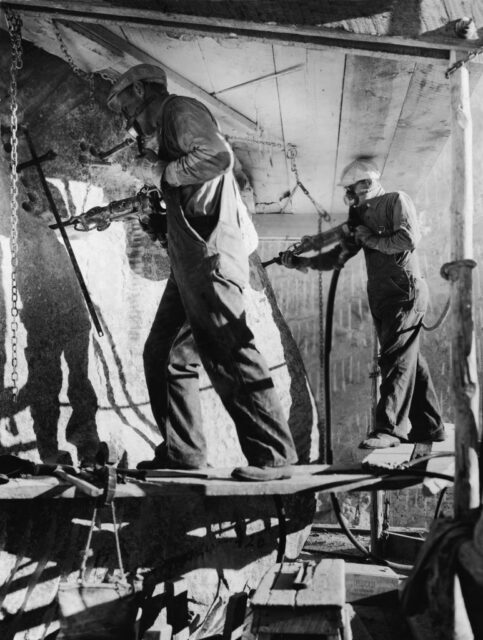
While Mount Rushmore is known for being four giant heads on a mountainside, it wasn’t initially supposed to look that way. As aforementioned, Gutzon Borglum initially wanted the sculptures to depict the presidents from head to waist, but couldn’t, due to a lack of funding.
The designer had also hoped to have a massive panel in the shape of the Louisiana Purchase that commemorated the likes of the Declaration of Independence, the US Constitution, the Louisana Purchase and seven other land acquisitions, spanning from the Panama Canal to Alaska. Unfortunately, this, too, remained a dream, on account of a lack of funding, unexpectedly hard granite and a looming war.
More from us: The Mummy of Pharaoh Ramesses II Needed a Passport to Fly to France
Borglum ultimately passed away before the project concluded, with him dying in 1939. His son, Lincoln, took over as the lead designer.
